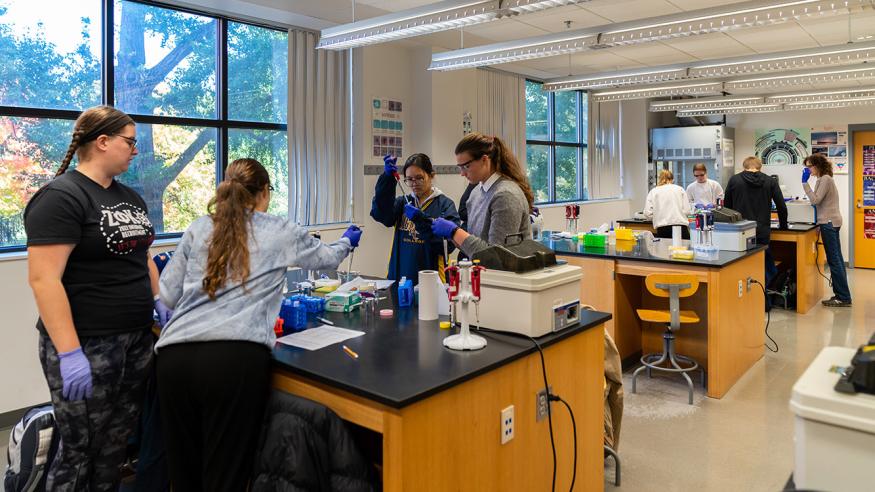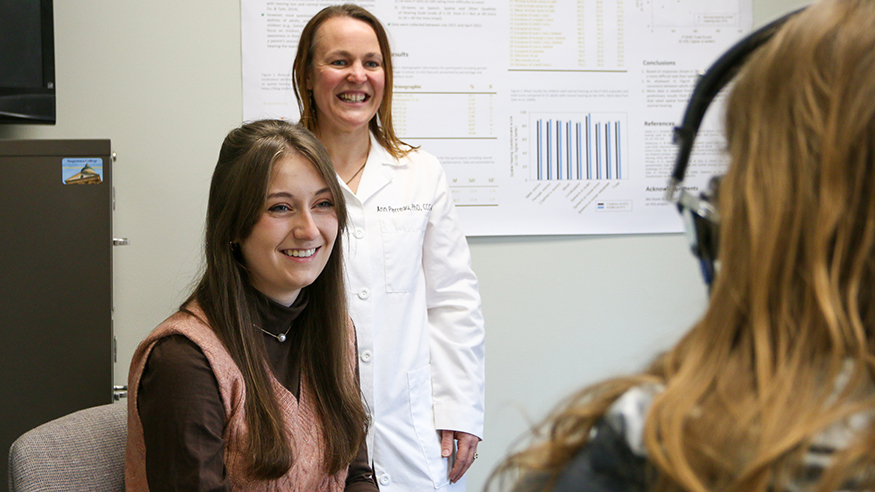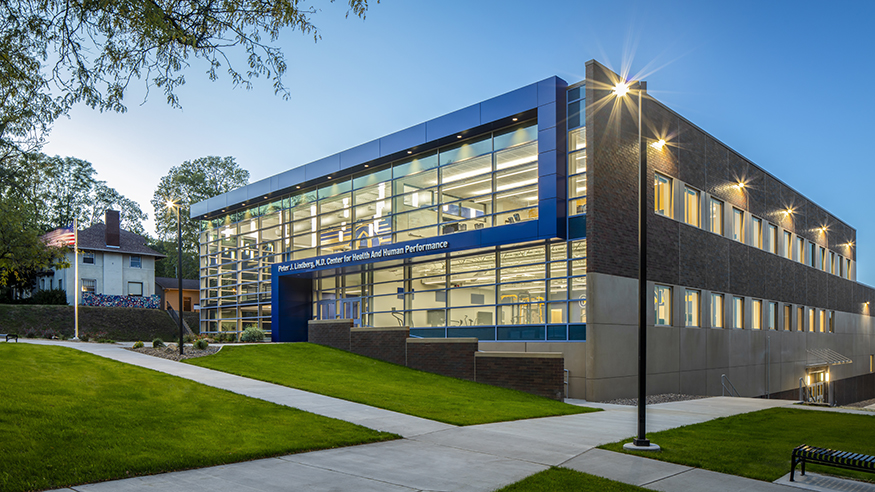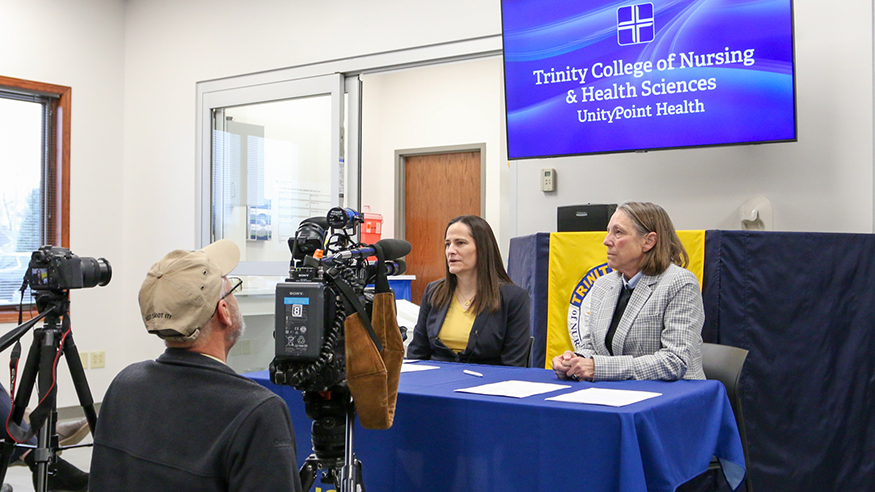
Augustana prepares health professionals for a world that needs them
Medical school was always her dream, and she got there. Yet Alison Lawrence '23 also was "rewarded in unexpected ways" throughout her Augustana journey towards that goal.
"I not only learned biology and chemistry, but also learned how to place such topics in conversation with the world around me. I've found that engaging with different perspectives is every bit as important as an MCAT score."
While Lawrence's MCAT score may have gotten her into the UCI School of Medicine, her experience in encountering different perspectives as an undergraduate, and connecting her learning to real life, will serve her well throughout a future as an empathetic healthcare provider.
The acceptance rate for Augustana pre-med majors into medical school is about 50% above the national average, thanks to an excellent liberal arts foundation plus intensive, concrete work in the sciences, and the careful focus of a pre-med advisor.
A liberal arts standout in the sciences
Provost Dianna Shandy has referred to Augustana as an "ecosystem" in the way the college is "genuinely based in the liberal arts and sciences." In 2014, Augustana became one of the first liberal arts colleges to add a major in public health. Augustana has a 100% acceptance rate for graduates into public health master’s programs for 25 years, since well before introducing the major.
In 2014, Augustana became one of the first liberal arts colleges to add a major in public health.
In part, this success may connect to the interdisciplinary nature of public health, which reflects how the liberal arts works. Dr. Dara Wegman-Geedey, Augustana professor of biology, has pointed out that “public health touches on everything in our lives,” from the wearing of seatbelts to fluoride in the water, from mental health programs to protocols around firearm use.
If the public health academic program is a microcosmic example of how the liberal arts works, it also is a natural fit for Augustana's campus culture and institutional mindset. More and more, the general approach to health care, wellness and health education includes recognition of the need for a deeper, more caring culture of prevention, and not just treatment.
Augustana's longtime commitment to public health stems from the college's roles as an institution of higher learning and as a community partner — in the neighborhood, the Quad Cities region and beyond.
An 'anchor institution in the region'
For nearly 80 years, Augustana has been teaching student clinicians and serving Quad-Cities community members with speech, language and hearing disorders in its on-campus clinic. The Barbara A. Roseman Center for Speech, Language, and Hearing was expanded in 2020.

Using the clinic, undergraduates majoring in communication sciences and disorders (CSD) and graduate students in the accredited speech-language pathology master's program provide intervention services to about 90 families each semester. Substantial clinical experience, research and service under the supervision of faculty has led to a 95-100% acceptance rate for Augustana CSD majors into graduate programs every year.
Another new resource for students in the health sciences is The Peter J. Lindberg, M.D., Center for Health and Human Performance on campus. Completed in 2021, the 52,000-square-foot center services athletes and students studying kinesiology and public health, as well as those in the exercise science, sports management and physical therapy coordinated-degree programs.
The Lindberg Center also is home to the Augustana Center for the Advancement of Community Health and Wellness. This resource and Augustana's Upper Mississippi Center for Sustainable Communities (UMC) are engines for student and faculty research and other community health-related initiatives.
For its impact on the local community, Augustana president Andrea Talentino sees the college as an "anchor institution in the region." Further, "the broader community benefits from Augustana graduates who can engage in the work needed to solve community challenges, thanks to their hands-on, project-based experiences as students."

Examples of these project-based experiences range from environmental challenges to health care and wellness:
- The Sustainable Urban Watersheds research project, a multi-year partnership with the City of Davenport and Partners of Scott County Watersheds to assess the health of local watersheds. Students present findings to relevant city and NGO leaders and engage in a 10-week faculty-mentored research project in the summer.
- A water line inventory project with the cities of Rock Island and Port Byron is another successful example of engaged partnership with local communities, in which Augustana students and faculty canvass homes to identify and inventory lead water service lines, then present their findings with city leaders.
- A multi-year plan to reduce low birth weights in Rock Island and Scott counties, in which Augustana students advance research into this significant public health project that affects the Quad-Cities community and much of the United States, especially due to health disparity outcomes for the historically disadvantaged.
- Fit & Strong! fitness program for older adults, led by Augustana students at the nearby Moline Activity Center.
A legacy of graduating 'impactful citizens'
Projects such as these reflect priorities in Augustana's Bold & Boundless strategic plan, which President Talentino described as "fundamentally different in that it's not really about us as a college," but instead is "focused on students and the value to the world that we want them to bring."

"We want to produce amazing graduates who can be impactful citizens, which has been our legacy since 1860," President Talentino said.
New academic programs at the college consistently reflect the college’s core values and strategic partnerships for student success. Responding to student interest and fastest-growing careers in health care, Augustana recently introduced a direct-entry 2+2 nursing program partnership with nearby Trinity College of Nursing & Health Sciences. The program allows students to graduate with a bachelor of science in nursing (BSN) after completing two years at Augustana and two years at Trinity College.
Students in the direct-entry 2+2 BSN program have the liberal arts foundation that provides the ideal background for treating patients, and prepares graduates for the complex future of health care.
This liberal arts background combined with real opportunities to make a difference — such as research and internships — can lead Augustana students to experience what biochemistry, chemistry and public health graduate Addison Larson '24 described as a "fascination" for the work.
Larson plans to pursue an M.D. and Ph.D. to become a pediatric infectious disease physician-scientist. To prepare, after she graduated from Augustana in spring of 2024, Larson returned to the lab of Dr. Katy Patras in the Virology and Microbiology Department at Baylor College of Medicine, where she had had a summer internship at the Texas Medical Center — a program available to Augustana juniors in many fields.
Larson is continuing the research that she loves and connecting with current infectious disease physicians. Perhaps she will return to Augustana in the future, to celebrate the college’s newest partnerships and achievements in the advancement of health care.
